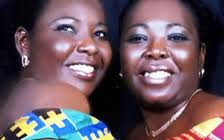Theatre is definitely in the air as the number of Ghanaians who patronize the theatre arts grows daily. It can be argued quite rightly that Roverman Productions, given birth to by Uncle Ebow Whyte, is the main pioneer of reviving interest in theatre on a very large scale. This successful effort has brought life back to the stage and the limelight is definitely not just on screen now. Most important of all, it has paved the way for other good directors to further expand the industry of stage performance.
One such production is “Run For Your Wife”, an English Farce by Ray Cooney, directed by George Quaye (popularly known as Aboagye from Taxi Driver), staged at the National Theatre. Starring Fiate Kenneth Senyo (of Games People Play or Taxi Driver fame), Naa Ashorkor, Ekow Smith Asante, Dzifa Sogbe, Francis Adjei Bonsu ( of Opha K fame), Roland Adom (featured in most Roverman productions) and a special feature by Funnyface, the production proved to be a smash hit.
Though this particular play has been staged many times before, especially in the University of Ghana, School of Performing Arts, George Boakye definitely knew the difference he was adding to this play to make it unique from the rest. Apart from the choice in cast, this included a special feature by Funnyface and Castro, performing their single, “Banana”.
“Run For Your Wife” is a typical comedy of errors where two people can be having the same conversation but are talking about entirely different things. It also explores pun in an expert way that always draws out laughter from the audience. Adjei Sowah, a seemingly honest, and simple taxi driver, is caught in a very tight web of explaining his two different addresses which are unearthed as a result of him playing the hero. Naa Ashome Sowah is his wife and she lives in East Cantonment. Meanwhile there is the existence of a Mary Sowah who is also married to the protagonist and lives at labone. The play is a journey to seeing how Adjei Sowah juggles his double secret which is teetering over the edge to discovery. The presences of the two police inspectors adds much to the complication and comedy of the play and the very brief scene with the photographer (Funnyface) always drew an applause after each performance.
The jokes were very good and did not fall within the dangerous net of being overdone, or exaggerated. It was just right, thus the laughter was just right! Creativity was definitely explored in this play, especially in one scene where there were no words but simply actions, which were so heavy in meaning and done so well that the audience understood the joke and rewarded it with laughter. One person crosses the house with a bucket, another with medicine and yet another with water, while another simply looks on with astonishment. Adjetey Annang, playing the role of a homosexual, was truly a funny sight to see because he played it so authentically. It definitely stirred murmurs and laughter.
The set design was beautifully done except, it became quite confusing for the audience to tell which house was whose. Naa Ashorkor’s portrayal of hysterics in one scene was hardly convincing.
However, the cast maintained the interest level of their audience and each night saw quite a full house.
It is undoubtedly a wonderful thing to bring people together to watch and enjoy a stage production and get up close with the characters of the story. It is a nostalgic memory of the typical African “By the Fireside”. Kudos to George Quaye for furthering the cause of Theatre in this very professionally done way!
UPCOMING PLAYS AT THE NATIONAL THEATRE
An Inspector by J.B Priestly
The Importance of being Earnest by Oscar Wilde
Fences by August Wilson
Noises off by Michael Frayn
Meanwhile, watch out for “A Raisin in the Sun” for the 1st to the 4th of September at the University of Ghana, Efua Sutherland Drama Studio.




























